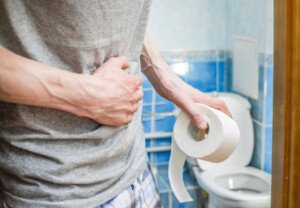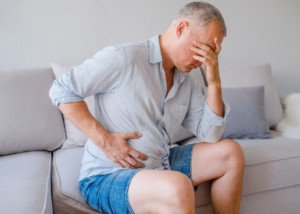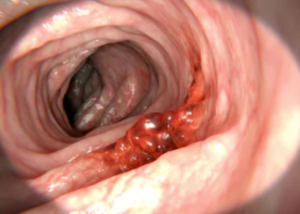The causes of diarrhea after eating are multiple, and one of them is cancer.
Diarrhea is an extremely common problem. But when it occurs seemingly only after meals, or when eating seems to be a trigger for most episodes, it can be especially worrisome to the sufferer.
“Diarrhea after eating a delicious meal is the worst!” says Benjamin Levy, MD, board certified gastroenterologist who’s provided clinical care to patients at Mount Sinai Hospital, Schwab Rehabilitation Hospital, and Sinai Medical Group Touhy Refugee Clinic.
“It’s especially annoying while on a date or a business meeting.
High fat meals can easily cause the runs – sometimes with an urgency to reach the bathroom at a speed that rivals an Olympic sprinter.”
Causes of Diarrhea After Eating that Have Easy Fixes
“Lactose intolerance is a major cause of diarrhea after meals,” says Dr. Levy.
“If you are experiencing diarrhea after meals, my advice is to eliminate dairy products including creams, cheeses and butter and see if this improves your diarrhea symptoms.
“You can purchase lactase enzymes cheaply over the counter and take some enzymes before ingesting dairy.
“For many people, lactase enzymes can be a game-changer and can dramatically improve quality of life if you like dairy.
“For those who are lactose intolerant, sometimes hard cheeses (like parmesan) are easier to digest and can be consumed safely.
“But patients need to experiment to see how extreme their lactose intolerance symptoms are and eliminate dairy accordingly.
“Lactaid milk and non-dairy milk, such as soy milk and almond milk, are easy substitutions that a lot of my patients enjoy.
“If you aren’t lactose intolerant and still experience diarrhea after an occasional meal, my next advice is to avoid heavy, high fat, greasy meals.”
Does Gluten Tie into any of This?
“If eliminating dairy and fat doesn’t improve your loose bowel movement symptoms, the diarrhea may be the result of a gluten sensitivity or allergy that requires a physician to perform testing for an official diagnosis,” says Dr. Levy.
More Frequent Diarrhea + Cancer
Diarrhea may be so frequent that there’s usually an episode soon after eating.
The eating may or may not trigger the diarrhea. In some cases of frequent diarrhea, the meal beforehand is just a coincidence. Nevertheless, something needs to be done about this messy symptom.
“If your diarrhea is persistent, I definitely recommend seeking medical attention quickly to make sure you don’t have an infection that could be treated or another medical condition, such as IBS or colon cancer,” says Dr. Levy.
A cancer in the colon would not lead to diarrhea simply because of food intake, but diarrhea that occurs for no apparent reason and at odd times (such as after eating a healthy meal) can be due to colon cancer.
Keep in mind that when colon cancer causes diarrhea (which can occur at any time due to this disease), there will almost always be other suspicious symptoms such as abdominal pain, back pain, nausea, new-onset fatigue or blood in the stool.
Irritable Bowel Syndrome
“I have many patients who have persistent diarrhea that is caused by IBS,” says Dr. Levy. “Sometimes the IBS diarrhea symptoms manifest themselves after a meal.
“Gastroenterologists have a wide arsenal of successful treatments for IBS diarrhea, so I recommend seeing a doctor.”
- IBS is a diagnosis of exclusion.
- There is no test “for” IBS.
- For IBS to be diagnosed, tests for all other possible causes of diarrhea need to turn up negative. This means that the patient needs to undergo a colonoscopy, since some causes of diarrhea can only be determined via colonoscopy.
Microscopic colitis is one such condition that cannot be diagnosed without a colonoscopy – via which the physician collects random samples of colon tissue for a microscopic analysis.
This benign inflammatory bowel condition can cause diarrhea at ANY time, and for some patients, eating seems to be a trigger.
“Finally, diarrhea can be a symptom of colon cancer, particularly when there is a partial obstruction of the patient’s bowel, so if the diarrhea is recurrent and an infection has been ruled out, a colonoscopy should be considered,” says Dr. Levy.
“I would definitely recommend a colonoscopy for anyone experiencing diarrhea with rectal bleeding, unintentional weight loss or anemia.”
 Dr. Levy’s research and clinical projects have focused on health care disparities, GERD, the early detection of pancreatic cancer and the development of colon cancer screening campaigns.
Dr. Levy’s research and clinical projects have focused on health care disparities, GERD, the early detection of pancreatic cancer and the development of colon cancer screening campaigns.
 Lorra Garrick has been covering medical, fitness and cybersecurity topics for many years, having written thousands of articles for print magazines and websites, including as a ghostwriter. She’s also a former ACE-certified personal trainer.
Lorra Garrick has been covering medical, fitness and cybersecurity topics for many years, having written thousands of articles for print magazines and websites, including as a ghostwriter. She’s also a former ACE-certified personal trainer.
.










































